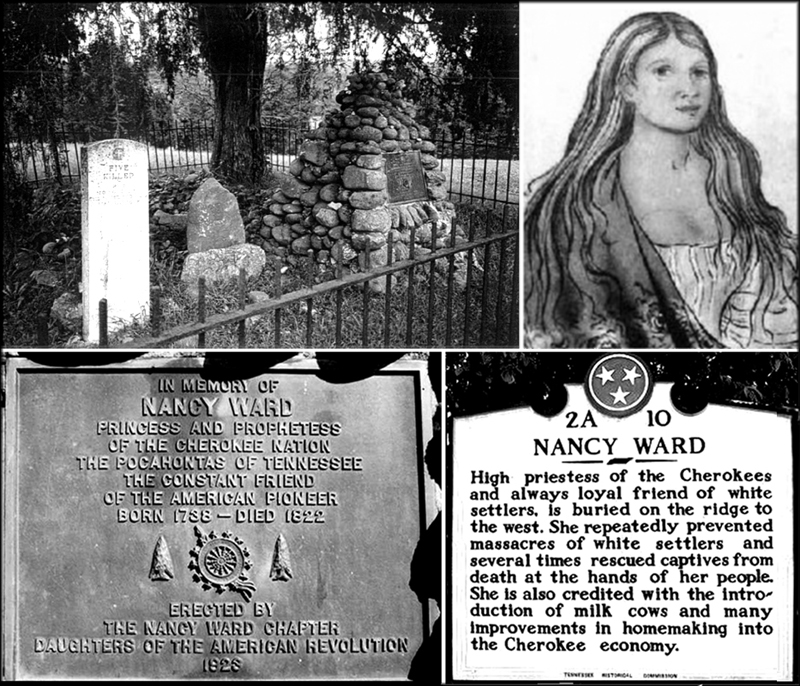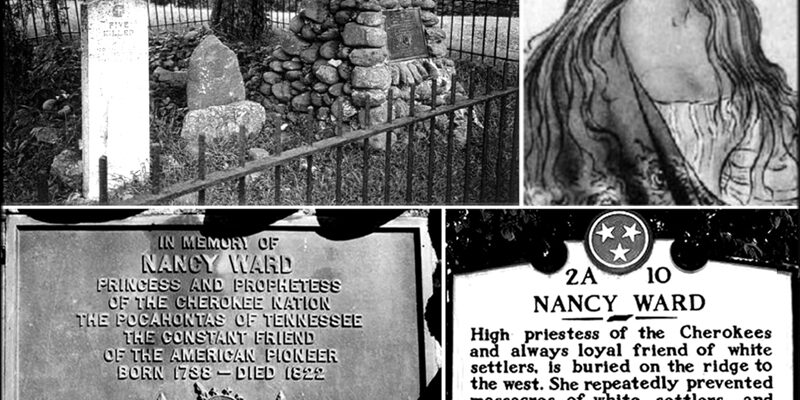Recently, I examined the book, Tennessee History Stories (T.C. Karns, B.F. Johnson Publishing Company, 1904). One subject grabbed my attention – Nancy Ward, who became Tennessee’s Pocahontas. What did she do to earn such a prominent place in Tennessee history?
Most people are familiar with the heroics of Pocahontas, an Indian girl who saved the life of Captain John Smith in Virginia, after becoming a friend of the white man. Unless your are a student of Tennessee history, you likely are not familiar with the lesser-known name, Nancy Ward. Like Pocahontas, she became friends with the white man and endeavored to promote goodwill between him and the red man.
Nancy’s father was an English officer, while her mother was of royal Cherokee blood, being the sister of the vice-king, Atta-kulla-kulla. Nancy's residence was at Chota, (Madisonville, TN) on the north bank of the Tellico River. The town was the capital of the Cherokee nation and became known as a city of refuge to those who had committed a crime and went there to prevent imprisonment or execution.
Nancy became known as a prophetess because it was believed that she was under the control of the Great Spirit, which included looking into the future and foretelling her people what was going to transpire. Not only was her wigwam larger than the others, she resided near the chief, which was close to the great council house where important meetings were held such as declaring war or peace.
Ward’s standard of living was quite good. It was noted that she kept a charm on her door that comprised an otter restricted by the coils of a water snake. Two white men once came up the Tellico River to trade with the Indians for corn. A dispute arose between the two factions and the intruders were about to be killed by a crowd of Indians. Nancy found out about the quarrel and immediately rushed to the spot where she quickly defused the disagreement.
The prophetess explained to her people: “These men are our brothers; you must not ill-treat them.” Because of her standing with the tribe, her order was immediately obeyed without further ado.
Nancy did not stop there. She commanded that the white men's canoes be filled with corn. The surprised but grateful visitors rowed back down the river and informed everybody whom they encountered about this beloved woman named Nancy Ward.”
On another occasion, the Indians made a raid on the Watauga settlement and arrived at the house of William Bean, an associate and fellow longhunter of Daniel Boone. Bean’s wife, a friend to the Indians, did not seek safety in the fort, thinking she would be safe. The Indians carried her to the Indian towns on the Tellico River, where they tied her to a stake on a high mound with the intent of burning her alive. Before the wood could be kindled, Nancy Ward rushed to her side and secured her released.
Dragging Canoe, the great chief of the Chickamaugas, opposed Nancy, but her power was far too great to overcome. Mrs. Bean was not only set free but was given a guard to protect her on her way back to her husband and children on the Watauga. Whenever the Indians began the war dance and were getting ready to make an attack upon the white settlements, Nancy Ward would seek help from Isaac Thomas, an Indian trader, or some other trusted messenger to warn the settlers of impending danger.
The influence of this amazing lady also extended to John Sevier. After the frontiersman and other leaders had made a raid upon several Indian towns and were causing havoc on everything in their path, they arrived at Chota. “This town,” said the locals,” “must not be burned because it is the home of Nancy Ward, the friend of the white race.” The town was spared destruction.

Nancy died in 1822 and was buried near modern day Benton, TN. In 1923, a Chattanooga Chapter of the Daughters of the American Revolution placed a monument on her grave.

Comments are closed.